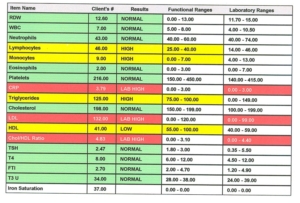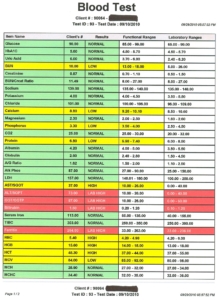Many people get an annual blood test from a general practitioner. The doctor says everything looks fine and that’s it. And many of these people still have symptoms. Well, there is a lot more you can get from Blood chemistry analysis than just screening for serious diseases. It can tell a lot about how your body is working/functioning. And often when people think of functional medicine testing, they think about more specialized tests like hormone tests, saliva tests, stool test and allergy tests. But in reality, the functional chemistry and urine analysis is the core in understanding how the body is actually doing. Combined with a thorough history and exam, we get a picture of 80 percent of the body’s function. For starters the typical annual test is a screening and only includes some of the available blood tests and only looks for diseases. The function Chemistry analysis uses 2-3 times as many tests. This way we can get a much clearer idea of how the body is functioning and not just if you are suffering from some sort of disease process.
With functional Blood Chemistry Analysis we can look at: Blood sugar insulin resistance, hypoglycemia and diabetes, acidity, kidney function, iron storage, the different types anemia and red blood cell health, immune system health and balance, thyroid health- there are seven different types of thyroid dysfunction, liver and gallbladder function, inflammation, fat metabolism, stomach acid, protein assimilation, vitamin b12 status and more. By looking at the multiple markers in combination we get a better picture of overall health. Most of the body’s are systems are interrelated and can have an impact on other systems. For instance, high or low blood sugar usually causes or is related to adrenal dysfunction. High or low blood sugar can cause inflammation, which will throw off multiple markers. Thyroid problems can affect pretty much every part of the body and that will change or be indicated in the other blood test markers. So, looking at a series or combination of test markers we put together the puzzle of health.
These are the are tests I usually recommend:
Hematocrit, hemoglobin, mean corpuscular volume (MCV), mean corpuscular hemoglobin (MCH), mean corpuscular hemoglobin concentration (MCHC), red blood cell distribution width (RDW), percentage and absolute differential counts, platelet count, red blood cell count (RBC), white blood cell count (WBC), Ferritin, Iron Saturation
Glucose, Insulin, HbA1c, Uric Acid, BUN, Creatinine, BUN/Cr, eGFR, Sodium, Potassium, Chloride, Magnesium, Calcium, CO2, Phosphorus, Total Protein, Albumin, Globulin, A/G ratio, Total Bilirubin, Alkaline Phosphatase, LDH, AST/SGOT, ALT/SGPT, GGT, Iron & TIBC, UIBC, LDL, HDL, VLDL, Total Cholesterol, Triglycerides, Chol/HDL ratio
| TSH | Free T3 | |
| Total T4 | rT3 | |
| Total T3 | TPO and Anti-thyroglobulin | |
| T3U Uptake | Free Thyroxine Index (FTI) | |
| Free T4 |
25-OH Vitamin D
Homocysteine
CRP-hs
URINALYSIS
Color, appearance, specific gravity, pH, protein, glucose, occult blood, ketones, leukocyte esterase, nitrite, bilirubin, urobilinogen, and microscopic examination of urine sediment
Typically, if you ordered these tests at a lab, this would cost between $500-700.00. But because I am a member of a doctors COOP, you can get all this information for only $220.00. It is a really valuable test. That being said, I will often order other specialized tests such as stool digestive panel and saliva hormone tests, if needed. But Functional Blood Chemistry Analysis is really the “ Holy Grail”.
Holy Grail”.

